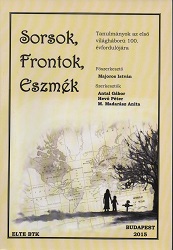Kollektív és családi emlékezet
Collective and Family Memory
The Centenary of the First World War Opening Speech
Author(s): Tamás Dezső
Subject(s): Cultural history, Local History / Microhistory, Pre-WW I & WW I (1900 -1919)
Published by: Eötvös Loránd Tudományegyetem, Új-és Jelenkori Egyetemes Történeti Tanszék
Keywords: Great War; 20th Train-Band Infantry Regiment; Nagykanizsa; Brusilow offensive; losses of the Faculty of Humanities; Eötvös Loránd University; Budapest; national remembrance; community remembrance;family
Summary/Abstract: The memory of the Great War is made up of three levels: national memory (the Hungarian tradition of remembrance), the community level (to commemorate the victims of smaller comunities), and the family level (to remember the losses of family members). The Austro-Hungarian Empire lost 1.1 billion lives, the Faculty of Humanities of Eötvös Loránd University lost 141 lecturers and an unknown number of students, who lost their lives on various fronts of the Great War. Almost all of the Hungarian families were affected by losses of lives. My great-grandfather was reported to his family as missing in action on the 20th of September, 1916 on the last day of the Brusilow offensive on the Russian front.The Great War, the last of the classical wars, a two dimensional war caused terrible losses not only in human lives (mainly of soldiers), but changed the world – irreversibly: two totalitarian ideologies (red and black) was born on its ruins, only to ’consume’ further tens of billions of lives during the IInd World War.
Book: Sorsok, frontok, eszmék. Tanulmányok az első világháború 100. évfordulójára
- Page Range: 11-16
- Page Count: 6
- Publication Year: 2015
- Language: Hungarian
- Content File-PDF

